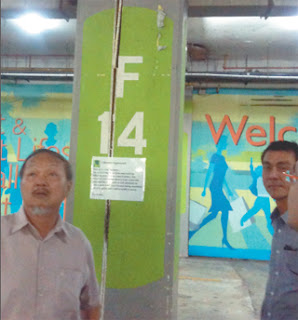KOTA KINABALU: Environmentalist Dr CY Vun yesterday rebutted the accusation of Tourism, Culture and Enviroment Minister Datuk Masidi Manjun that the rubbish dirtying the coastal areas in the city and the islands was largely attributed to the local population on the mainland here.
Vun claimed that the main culprits are the growing number of population in Pulau Gaya off here and the influx of foreigners in and around the state capital, including those squatting illegally on coastal areas and along the riverines such as in Kampung Air, Sembulan, Tanjung Aru, Likas and Sepanggar.
Through a survey he conducted and previous reports in local newspapers, Vun said it was found that residents from the islands themselves readily admitted to throwing rubbish into the sea due to lack of waste management on the islands.
“Trawlers’ crew members and operators as well as commuters who have to get to the mainland by boat daily, either to work or do some shopping, would pack along their domestic wastes and toss them into the sea during these boat rides.
“Illegal squatters such as those living along the coastal lines in Putatan and near the rivers in Sepanggar and even Likas areas are also the major contributors to the rubbish pollution here,” said the member of Sabah Environmental Protection Association (SEPA) and the Envrionmental Action Centre (EAC).
He added that Masidi and other relevant ministries should first “do a proper research” instead of conveniently putting the blame on the local population on the mainland.
“He (Manjun) said that a huge part of the rubbish comes from mainland rivers and irrigations that flow into the sea, and is later brought back to the coastal areas and shorelines.
“While Sabah Parks chairman Datuk Seri Tengku DZ Adlin also had on June 28, 2013, stated that Sabah Parks spent RM10,000 to clean up the rubbish affecting the shorelines and islands in Tunku Abdul Rahman Park, which he also said are mainly from the mainland.
“When they said that the rubbish are from the mainland, who are they actually blaming? The local citizens? There are over 3,000 people, including migrants and squatters living in Pulau Gaya and other coastal areas without any proper waste management, but both the Datuks (Manjun and Adlin) did not even mention them in their respective statements, which is utterly unfair,” stressed Vun.
“He (Manjun) must also remember that some of our local citizens had been residing and occupying water villages in and around the city such as Kampung Air, Sembulan and Tanjung Aru, since the 40s in their stilt houses, without being provided with proper waste management nor sewerage system.
“The only system that existed was disposing of everything into the sea. Even after all these years, nobody had ever even attempted to solve the problem that it has become a ‘tradition’,” he added.
Vun reckoned that the state government should face this perennial problem by going back to its roots, instead of pointing fingers at the local residents on the mainland as the main culprit.
“I urge that Datuk (Manjun) and the other relevant ministers to please do your research properly and go down to the ground to get first-hand information about the whole issue,” he said.
Read more: http://www.theborneopost.com/2013/07/20/unfair-for-masidi-to-blame-mainland-population-for-rubbish-environmentalist/#ixzz2ZZNQ3lnI




